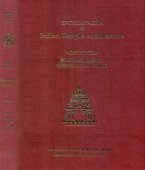Ikshvaku, Ikṣvāku, Īkṣvāku: 26 definitions
Introduction:
Ikshvaku means something in Buddhism, Pali, Hinduism, Sanskrit, Jainism, Prakrit, the history of ancient India, Tamil. If you want to know the exact meaning, history, etymology or English translation of this term then check out the descriptions on this page. Add your comment or reference to a book if you want to contribute to this summary article.
Ikshvaku has 25 English definitions available.
The Sanskrit terms Ikṣvāku and Īkṣvāku can be transliterated into English as Iksvaku or Ikshvaku, using the IAST transliteration scheme (?).
Languages of India and abroad
Sanskrit dictionary
[Deutsch Wörterbuch]
Source: Cologne Digital Sanskrit Dictionaries: Böhtlingk and Roth Grosses Petersburger WörterbuchIkṣvāku (इक्ष्वाकु):—
1) m. i oder ku [Pāṇini’s acht Bücher 6, 4, 174,] [Scholiast] Nomen proprium eines Mannes: yasyekṣvā.urupa vra.e re.ānmarā.yedhate [Ṛgveda 10, 60, 4.] [?(Atharvavedasaṃhitā 19, 39, 9)] ein Sohn des Manu Vaivasvata, Vater des Kukṣi und erster König von Ayodhyā [Rāmāyaṇa 1, 70, 20. 21. 2, 110, 6. fgg.] [Bhagavadgītā 4, 1.] [Mahābhārata 1, 3140. 13, 88.] [Harivaṃśa 443. 613.] [Viṣṇupurāṇa 348.] Vater von Viśāla [Rāmāyaṇa 1, 47, 12.] ein Urenkel Manu's und Vater Viṃśa’s [Mahābhārata 14, 66.] Nicht nur der du. ( [Rāmāyaṇa 3, 74, 4]) und pl. ( [Rāmāyaṇa 1, 5, 3. 23, 6. 4, 17, 9. 5, 7, 10.] [Viśvāmitra’s Kampf 7, 21.] [Raghuvaṃśa 1, 72. 3, 70. 13, 61]) sondern auch der sg. ( [Rāmāyaṇa 1, 70, 11.] [Viśvāmitra’s Kampf 9, 2. 11, 9]) bezeichnet zugleich einen Abkömmling Ikṣvāku’s Die Jaina lassen ihre Cakravartin und viele ihrer Arhant von Ikṣvāku abstammen [Hemacandra’s Abhidhānacintāmaṇi 35. 694.] Der pl. ist Name eines auf Ikṣvāku zurückgehenden Kriegerstammes [Pāṇini’s acht Bücher 4. 1, 168,] [Scholiast] ikṣvākurājñaḥ subalasya [Duaupadīpramātha 2, 9.] — kṣuvatastu manorjajña ikṣvākurghrāṇataḥ sutaḥ [Bhāgavatapurāṇa] in [Viṣṇupurāṇa 359. Nalopākhyāna 7.] Die Buddhisten führen den Namen auf ikṣu zurück [Lebensbeschreibung Śākyamuni’s 233 (3); Griechischen und Indoskythischen Könige] ([Lassen’s Indische Alterthumskunde I, 497]) glaubt, dass Ikṣvāku wegen seiner grossen Nachkommenschaft nach der Gurke (s. u.
2) so benannt sei, wie auch die eine Frau des Sagara, welcher [60,000] Söhne versprochen waren, zuerst eine Gurke gebar. —
2) f. saure Gurke [Amarakoṣa 2, 4, 5, 21.] [Hemacandra’s Anekārthasaṃgraha 3, 10.] [Medinīkoṣa k. 49.] [Suśruta 1, 144, 11. 160, 1. 2, 89, 3. 174, 14.] Nach [HESSLER] : die Coloquinthe (Citrullus colocynthis Schrad.); der Vulgärname ist titalāu (nach [VOIGT] : die Frucht einer wilden Varietät der Lagenaria vulgaris Ser.).
--- OR ---
Ikṣvāku (इक्ष्वाकु):—[Z. 1] zu lesen ikṣvāku
1) m. Nomen proprium eines Mannes u. s. w. Beim [Scholiast] zu [Pāṇini’s acht Bücher 6, 4, 174] ist vom zweifachen Accent des Wortes aikṣvāka die Rede. pl. Nomen proprium eines Volkes [Varāhamihira’s Bṛhajjātaka S. 5, 75. 9, 17.] sg. der Fürst der Ikṣvāku [11, 58.] [Sp. 778, Z. 3 v. u.] die aus dem [Bhāgavatapurāṇa] citirte Stelle steht [9, 6, 4.]
Source: Cologne Digital Sanskrit Dictionaries: Sanskrit-Wörterbuch in kürzerer FassungIkṣvāku (इक्ष्वाकु):——
1) m. — a) Nomen proprium eines alten Fürsten. — b) ein Abkömmling Ikṣvāku's. — c) Pl. Nomen proprium eines Volkes. — d) ein Fürst der Ikṣvāku. —
2) f. eine saure Gurkenart.
Sanskrit, also spelled संस्कृतम् (saṃskṛtam), is an ancient language of India commonly seen as the grandmother of the Indo-European language family (even English!). Closely allied with Prakrit and Pali, Sanskrit is more exhaustive in both grammar and terms and has the most extensive collection of literature in the world, greatly surpassing its sister-languages Greek and Latin.
See also (Relevant definitions)
Starts with: Ikshvakucandramas, Ikshvakukulaja, Ikshvakukulanandana.
Ends with: Aikshvaku.
Full-text (+283): Aikshvaka, Vikukshi, Nimi, Dashashva, Ikkhaga, Kalmashapada, Mahabhisha, Ulkamukha, Shashada, Vrishabhasvamin, Madirashva, Anaranya, Saudasa, Nabhas, Aikshvakava, Ikshvakukulaja, Aranya, Sumitra, Ikshvakucandramas, Arankam.
Relevant text
Search found 84 books and stories containing Ikshvaku, Ikṣvāku, Iksvaku, Īkṣvāku; (plurals include: Ikshvakus, Ikṣvākus, Iksvakus, Īkṣvākus). You can also click to the full overview containing English textual excerpts. Below are direct links for the most relevant articles:
Rig Veda (translation and commentary) (by H. H. Wilson)
List of Mahabharata people and places (by Laxman Burdak)
Bhakti-rasamrta-sindhu (by Śrīla Rūpa Gosvāmī)
Verse 3.2.29 < [Part 2 - Affection and Service (dāsya-rasa)]
Verse 3.2.97 < [Part 2 - Affection and Service (dāsya-rasa)]
Ramayana of Valmiki (by Hari Prasad Shastri)
Chapter 55 - The Story of Nimi < [Book 7 - Uttara-kanda]
Chapter 19 - Ravana fights with Anaranya < [Book 7 - Uttara-kanda]
Chapter 57 - The End of the Story of Vasishtha and Nimi < [Book 7 - Uttara-kanda]
Amaravati Art in the Context of Andhra Archaeology (by Sreyashi Ray chowdhuri)
Region Beyond The Coastal Lines (2): Nelakoṇḍapalli < [Chapter 2 - Amarāvatī and other Archaeological Sites of Ancient Andhra Pradesh]
Lower Kṛṣṇā Valley (8): Nāgārjunakoṇḍa < [Chapter 2 - Amarāvatī and other Archaeological Sites of Ancient Andhra Pradesh]
Lower Kṛṣṇā Valley (19): Yeleśvaram < [Chapter 2 - Amarāvatī and other Archaeological Sites of Ancient Andhra Pradesh]
Charaka Samhita (English translation) (by Shree Gulabkunverba Ayurvedic Society)
Chapter 3 - The Pharmaceutics of the Bottle Gourd (ikshvaku-kalpa) < [Kalpasthana (Kalpa Sthana) — Section on Pharmaceutics]
Chapter 19 - The therapeutics of Diarrhea (atisara-cikitsa) < [Cikitsasthana (Cikitsa Sthana) — Section on Therapeutics]
Related products





